South Sudan admits losing top level officers in Malakal battle
February 21, 2014 (JUBA) – South Sudan’s government has admitted losing several of the top level military officers in the latest battle over the control of Malakal town, capital of beleaguered Upper Nile State.

Despite a ceasefire deal signed on January 23 between rebels and the government on February 17 there was a fresh armed confrontation between soldiers loyal to the government of President Salva Kiir and armed elements allied to the former vice- president, Riek Machar.
Senior military officers in a series of interviews with Sudan Tribune on Friday that the rebels entered Malakal town after some sections of the South Sudan army (SPLA) abandoned their positions.
“We came to know some of our colleagues have deserted their positions when the enemy appeared in control of some parts [of Malakal] and areas initially held by some of our comrades and started advancing towards our positions. This was how some colleagues of different ranks, soldiers and senior officers were caught and killed”, a senior military officer told Sudan Tribune on Friday.
The officer, who did not want to be named, is currently being treated for wounds sustained in the fighting for control of Malakal at the military hospital in Juba. He named Brigadier Garang Tong Atak, known locally as Garang–Awertoch, in his home state of Northern Bahr el Ghazal, as one of the top level military officers killed.
“Comrade Garang is one of the senior officers who have lost their lives. Oh, he was a great and skilful military officer but that [is] what happened. When a country is thrown into such crisis, best men and women take the risk in the interest of the nation”, the officer told visiting family members while being helped to sit up right on his bed.
Western Bahr el Ghazal State police commissioner, Major General Akot Deng Akot, confirmed the loss of the man he described “a true comrade in arms” and accomplished officer during his entire life while serving with the SPLA.
From 1983 until 2005 the SPLA was a rebel group which fought the Khartoum government until a 2005 peace deal, which allowed for the 2011 referendum on South Sudanese independence.
For the last nine years it has struggles to make the transition into a national army, with most soldiers still loyal to their local commander rather than national leaders.
“Comrade Garang- Awertoch was a distinguished and an accomplish officer. He never failed any mission and assignments given by the leadership since joining the SPLA. He was one of our best officers the leadership has had at the time. That was he never missed any assignment and this explains why he was in Malakal”, Akot reportedly told a group of mourners on Thursday in Wau town, capital of Western Bahr el Ghazal.
Daniel Akol Diing, a state government chief whip in Northern Bahr el Ghazal also expressed his condolences over the death of the officer, describing also him as “a great man” but that the deceased “died defending the constitution of the country”.
This is the second time the people of Northern Bahr el Ghazal have lost a prominent figure serving in the army on the side of the government. Brigadier General, Akoon Marac, also a son of Northern Bahr el Ghazal, who was commanding SPLA forces in Yei River county, Central Equatoria state, was killed in January, when he fell into an ambush laid by the rebels on the Juba-Yei road.
A Sudan Tribune reporter in Juba who visited the military hospital in Juba observed a pile of military attires of individual soldiers soaked with blood as a result of gunshot injuries.
It appears as if those who evacuated from Malakal with serious injuries were senior military officers.
The conflict began on December 15 when members of the Presidential Guard began fighting each other in disputed circumstances. Machar denied allegations that he had attempted to stage a coup but is now leading loose coalition of defected soldiers, military officers and armed civilians are demanding a change to the current system of government.
The President’s opponents have accused Kiir of becoming increasingly dictatorial in the two years since independence and claim that he attempted to use the conflict within the army on December 15 to eliminate political opponents.
(ST)
